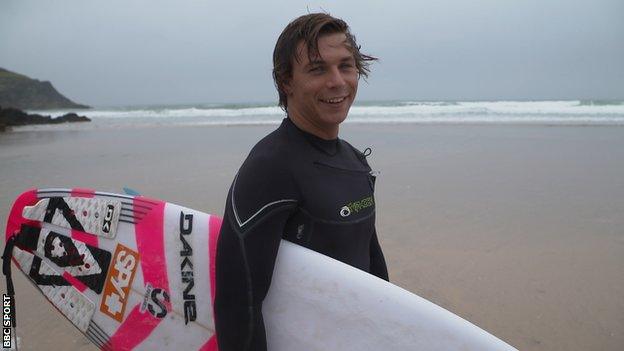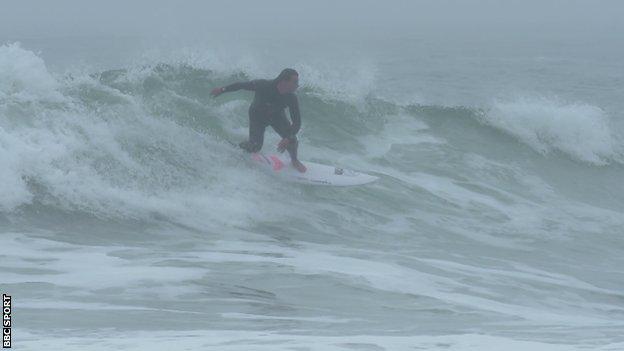World Surfing Games: Tokyo 2020 Olympic Games can boost GB surfing says Luke Dillon
- Published

British number one Luke Dillon is hoping to break into the world's top 100
Britain's number one surfer Luke Dillon says the Olympic Games is a chance for the sport to grow its appeal in the UK.
This week, the sport holds its first world championships since its Olympic debut was confirmed for Tokyo 2020.
"We're on the back foot compared to other countries but we're getting better the last few years," Dillon told BBC Sport.
"With inclusion in the Olympics hopefully the sport will rise and we'll get up there soon," he added.
Dillon, 22, was a prodigious junior before joining the senior professional tour at the start of 2016.
The Newquay man broke into the world's top 150 in his rookie season and hopes to push into the top 100 in the next year before ultimately appearing for GB at the Tokyo Games.
"Going for an Olympic medal is something that athletes dream of," said Dillon.
"To even have myself in that bracket I'm really proud. But now it's there I kind of want to go and get it."
Ordinarily, Dillon would have been competing in Japan this week at a prestigious, and potentially lucrative, six-star event on the World Surfing League circuit.
However, he has decided to compete for his country at the World Surfing Games in France - which is run by the same organisers of the Tokyo 2020 event.
He says other high-ranked professionals are joining him, such is the excitement surrounding the Olympic inclusion.
"I know guys in the top 32 in the world who are going to France to prove a point to then hopefully go to the Olympics and get this Olympic medal," said Dillon.
"This is a really big opportunity for surfers all over the world."

Dillon practising for the forthcoming world championships in Newquay
Although Dillon is progressing year-on-year his route to Tokyo will not be easy.
Great Britain is still playing catch-up to more traditional surfing nations such as Australia, the United States, Brazil and even France when it comes to the professional scene.
"I don't have a surf coach; I've just learned by myself watching videos," Dillon explained.
"I live from competition to competition, with nothing in between, and save all my money and try to work it out on the budget I've got.
"A lot of the other guys I'm competing against are on six-figure contracts.
"The Australians and Americans have had a structure in place for a couple of decades now.
"They have surf coaches, personal trainers, nutritionists, they get massages after every heat.
"Here, we're kind of getting the building blocks now.
"But I'm staying in touch with these guys with what I'm doing now so if I can improve a little bit, get some good people around me, then I think I can get up there."
World Surfing Games - how it works
More than 45 countries involved
Team, men's individual and women's individual medals at stake
96 men start in round one in 24 heats of four men
There are six rounds before the final - between four men
Main event round losers go to the repechage event (of which there are nine) where they can still win to rejoin the main draw
Two go through from each heat to the next round
Events are timed with a competitor's top two judged sets within that time being averaged to achieve their total and ranking
There's also a repechage final
The women's event has four main event rounds then a final, with seven repechage rounds